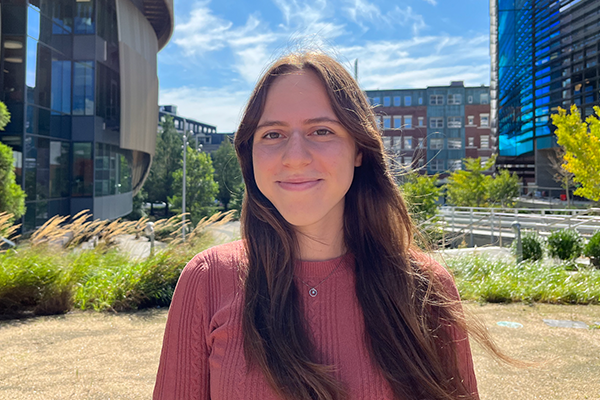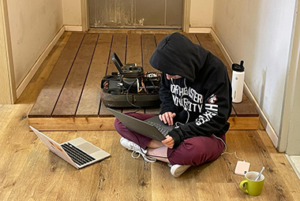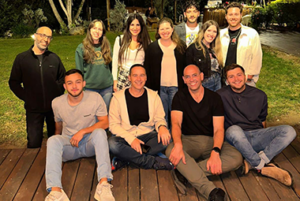With Confidence Boosted by Co-ops, Student Charts Career Path

Lia Shechter, E’25, computer engineering and computer science, did not have a clear career plan when she arrived at Northeastern, but two co-ops, including an international work experience, have helped her determine what she does—and does not—want to do.
At two co-ops, Lia Shechter, E’25, computer engineering and computer science, acquired an impressive amount of technology and workplace skills. She learned about cyber security systems, coded for embedded systems, developed people skills and time management, and lived and worked abroad. But the game changer for Shechter is the confidence she developed as a result of these experiences.
“I’ve seen some of my friends who have graduated from other colleges and have imposter syndrome,” Shechter says. Without a co-op experience, “they don’t know what to expect in the workforce. They are asking themselves, “Do I really know anything?’”
Shechter, on the other hand, believes she is more grounded and prepared for future jobs.
“I’ve had more than a dozen interviews, I’ve had two co-op classes, and two co-ops,” Shechter says. “I talk to my advisor a lot, and I’ve been updating my resume for about three years. It won’t be scary entering the real world after college.”
This self-assuredness is particularly important to Shechter because she did not arrive at Northeastern with any certainty about her career path. In fact, she is still figuring it out, but with each co-op, she is defining her direction.
Shechter’s first co-op was in the spring of 2022 at Rue Gilt Groupe in Boston. As a member of the cyber security team, she worked on compliance, which focuses on best practices and protocols for systems, data, and operations security.
While she loved the company and her co-workers, she discovered she was not passionate about cyber security. “I realized it was very valuable for me to understand what path I didn’t want to go down,” she says.
But it did teach her the basic responsibilities of holding a job. She had never worked a 40-hour work week before but was able to adjust to it and be accountable, whether she was onsite or working remotely. She also learned how to interact with team members and manage her workload.

Shechter wrote code for components of RoboDeck, a Roomba-like autonomous device for outdoor decks.
In the fall of 2022, Shechter made plans for an international co-op that would take her to Israel, where she had visited many times to see her extended family. She got a job at RoboDeck, a start-up that is developing an autonomous device that performs like a Roomba for outdoor decks. This experience not only provided her opportunities to write code and learn about robotics and embedded systems, but she also proved to herself that she could live and work abroad.
“I realized that I really, really enjoyed working with embedded software, and felt the work was making full use of the engineering knowledge I’ve acquired so far,” Shechter says.
She also learned that she wants to work in an environment where she can be hands-on and directly impact a company’s products. At RoboDeck, she wrote code to enhance the navigation system for the device and she could immediately see results. “I realized I like working where everyone’s contributions are important,” she says.

Shechter (upper row, second from left) with the RoboDeck team.
She also came to understand that annual trips to family do not compare to living and working in another country for several months. “I learned I can relocate to another country, figure it out, adapt to the environment, and still be okay,” she says.
Shechter is planning a third co-op for the spring 2024 semester at Whoop, a fitness tracker company in Boston, where she will work as an embedded firmware engineer. She has come a long way from when she first arrived at Northeastern, uncertain about next steps.
“I was not positive about what I wanted to do in the future, and I think a lot of 18-year-olds aren’t confident about that,” Shechter says. “The opportunity to not just learn in the classroom but to see what a future job might be like is very valuable.”